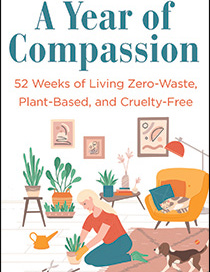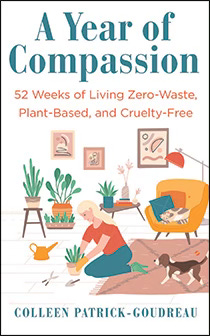A Year of Compassion: 52 Weeks of Living Zero-Waste, Plant-Based, and Cruelty-Free
A book review, plus a few thoughts on Abundance by Ezra Klein and Derek Thompson
A Year of Compassion: 52 Weeks of Living Zero-Waste, Plant-Based, and Cruelty-Free
Colleen Patrick-Goudreau
Island Press
188 pages
Author and TED talker Colleen Patrick-Goudreau—known as the Joyful Vegan—adds to her list of books that inspire us to adopt a vegan diet. This time she expands her scope to include strategies to care for and be kind to animals, as well as ways to live more softly on the Earth.
A Year of Compassion: 52 Weeks of Living Zero-Waste, Plant-Based, and Cruelty-Free is a slim book, less than 200 pages, including reference notes and is organized into week by week topics, 52 of them, covering a full year. The index indicates each week with icons of the books three topics of zero-waste, plant-based diets, even a bunny for the chapters emphasizing kindness to animals. Throughout the tone is no-nonsense, upbeat, and certainly not preachy. Your non-vegan friends could read this book without rolling their eyes.
This book is well-informed. For example, because the carbon footprint of transporting a food may be way less than the carbon footprint of producing the same item, Patrick-Goudreau suggests in Week 37 that the adoption of a local diet is less about lowering emissions than it is about supporting local farmers.
Many vegans are motivated in their dietary choices because they want to reduce or eliminate the cruelty of animal farming, particularly factory farming. For many that’s the beginning and end of the issue. Patrick-Goudreau goes further. Week 3 concerns caring for sick and injured animals; Week 49 emphasizes the importance of volunteering at wildlife rehabilitation centers and veterinary clinics.
Patrick-Goudreau knows that if her readers simply reuse glass jars and substitute some tofu for chicken, their actions, while meaningful, would have little effect on the larger world. That is why throughout her book she encourages larger efforts: lobbying elected representatives and supporting organizations such as Habitat For Humanity and the Buy Nothing Project.
The book is more than a how-to guide, and offers broad outlines for living life cruelty- and waste-free. We can see this in Week 47, which covers composting. One paragraph describes backyard composting and another covers vermiposting. There is a lot of information in two pages, but it’s only two pages. If you take this subject seriously, you’ll probably want to read more extensive how-tos on the internet, watch a couple of YouTube videos on the subject, and talk with friends and family who compost for tips on the process and what to expect. You may possibly check out a book on composting from the library.
I like this thin, easy-to-digest book that is just brimming with terrific suggestions. Yet there were times I wanted more. A number of chapters have bullet-pointed suggestions, such as these:
Turn mashed potatoes into potato pancakes, sauté them in onions and garlic for a delicious “hash”, or make homemade gnocchi.
Make a sloppy sandwich out of leftover stir-fried vegetables. Add lettuce, avocado slices, and eggless mayonnaise.
But after reading half a page of such ideas I found myself thinking, “OK, next!” without really absorbing the point being made. I admit I read the book as a critic, going through it in the week or so I’ve had it in my hands, and these points might sink in more if I were to pace myself through the text in the suggested week-by-week framework set by the author. Still, I’d be more inclined to try these food leftover ideas if there were more detailed recipes.
As to the 52-week framework, I don’t think many people will literally adopt these sustainability and vegan practices week after week. If you’re like me, you’re going to need way more than a week just to wrap your head around a lot of them. Some of the practices, such as Week 31, Choose Clean Energy For Your Home—installing double-pane windows, switching to energy-efficient appliances, etc., are going to take an individual or a family months to implement.
A few ideas seem a little over the top. Patrick-Goudreau suggests keeping a spare leash to remain prepared for the times you may encounter a stray dog. For me, if I were to tuck away a spare leash, I’d forget where I put it by the time I might need it.
This may be a useful book for a family or community group, helpful to those who want to go vegan and cruelty-free, as well as others who may be more interested in avoiding the recycle trap. A Year of Compassion: 52 Weeks of Living Zero-Waste, Plant-Based, and Cruelty-Free offers a good starting point to adopt veganism and a less wasteful life.
A few thoughts on Abundance by Ezra Klein and Derek Thompson
This really isn’t a full review, but I read Klein and Thompson’s book this last week and just wanted to share some thoughts on it.
The housing crisis that they write about through much of this book is a real problem. NIMBYism and the misuse of zoning, as well as environmental review, such as California’s CEQA, can and too often does lead to exasperating added costs and delays. Yet Klein and Thompson do not address the other factors that have driven up home prices and rents.
Through much of the country, private equity firms are scooping up apartments, condos, and houses, and paying cash to boot. They then raise rents while skimping on maintenance and pest control to maximize their profits. The tenants they often evict face moving costs and thousands of dollars in unexpected expenditures for first month/last month and damage fees. Some of them can’t come up with the money and face homelessness.
People just don’t make the money that they used to. Through right-wing legislation such as Taft-Hartley Act and well-funded union busting efforts, labor unions have been severely weakened, if not eviscerated. Sixty years ago, union membership in some states exceeded 30 percent. Union membership in my home state of West Virginia was 36.5 percent in 1964. Today, union membership in some states does not rise past single digits.
Minimum wage has not kept pace, either. When I was making minimum wage of $2.20/hour in the seventies, I could afford the $100.00/month rent for a three-bedroom apartment in my hometown. The current federal wage of $7.25/hour could not keep you in a very modest two-bedroom that rents for $1000/month.
At one point the authors explain how devastating meat consumption is for the planet. Vast amount of former forest land and wildlands have been sacrificed to satiate our hunger for hamburgers and chicken wings, not to mention the great output of greenhouse gases caused by raising livestock, and in particular, beef cattle,
And after all that Klein and Thompson say that there is nothing we can do about it because people like to eat meat.
What?
Human behavior, including our diets, is not set in stone. Humans have not always eaten so much meat, and we can reduce our meat consumption now. If Thompson and Klein need an example of how this can be done, they can look at drunk driving. Starting in the seventies, Mothers Against Drunk Driving (MADD) quietly lobbied state governments and the federal government to raise the drinking age, lower the blood alcohol levels for drunk driving, and increase penalties for drunk drivers. They also campaigned for greater awareness of the dangers of DUI and lifesaving decisions like designating a sober driver.
The results have been profound. Despite a population increase of over 100 million, with LOTS more people on the highways and freeways, highway deaths have reduced by about a quarter since the mid-seventies. (It must also be said that better automobile and highway design contributed to the decline.)
If that example is not enough to convince you, look at the successful anti-smoking campaign that started in the sixties.
Both Klein and Thompson are good, experienced writers; Thompson, a staff writer at The Atlantic and Klein, author of a New York Times bestseller. At points, however, the writing seemed unfocused, and the chapters could have been better organized. Perhaps a heavier hand from editor Ben Loehnen would have been helpful.
Have you read Abundance? What are your thoughts on the book?






I have always had trouble with the argument that transportation of food did not have a big impact, and looked into it for my book. Everyone quotes an Our World in Data post, which is based on research by Poore and Nemecek, who measured the distances trucks travelled and the carbon emissions from standard transport. They ignored refrigeration, which significantly reduces mileage since the truck powers the refrigeration, and ignored refrigerant loss, which is about 20% per year of serious greenhouse gases. They basically ignored the cold chain that makes bringing lettuce and strawberries from California possible, and totals about 4% of global emissions. And now we are getting more local food in the Northeast and Canada from vast natural gas fired greenhouses. In short, we have to eat local AND seasonal.
And don’t get me started about abundance!
Keep talking about it. Most people just want easy ways to feed their families. For instance, when I started reading your publication last year, I switched from ground beef to ground turkey in pasta and tacos, with no complaints from the family. Small step toward a little less impact👍